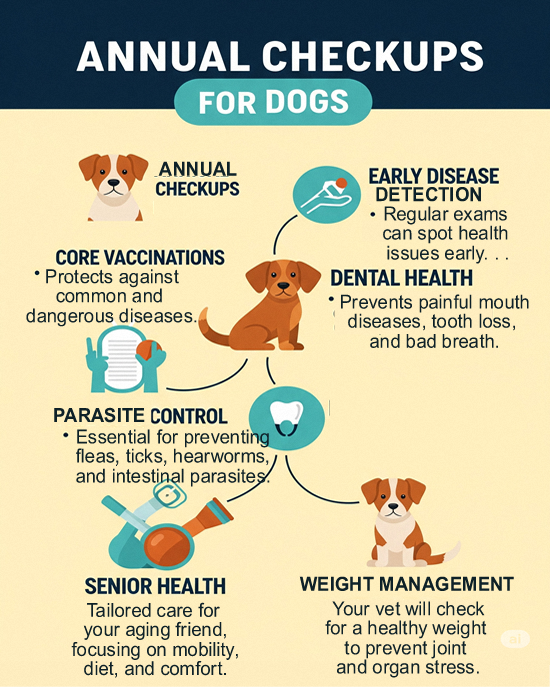A Complete Checkup for Dogs Guide: Why Annual Dog Checkups are Non-Negotiable

The soft thud of a tail wagging against the floor, the comforting warmth of a furry head resting on your lap, the boundless joy of a greeting at the door – these are the moments that define our lives with dogs. Our canine companions are more than just pets—they are cherished members of our families, bringing immeasurable happiness and unconditional love into our homes. Just as we prioritize our own health with regular medical appointments, it is imperative that we extend the same proactive care to our four-legged friends, and there is no more critical component of this care than consistent annual checkups for dogs.
These routine visits to the veterinarian aren’t merely bureaucratic necessities. They are the frontline defense in safeguarding your dog’s well-being, catching silent threats before they escalate, and ultimately, ensuring they lead the longest, healthiest, and happiest lives possible by our sides.
What Exactly Happens During a Dog Checkup? (Beyond Just a Shot)
A comprehensive checkup for dogs is a meticulous, nose-to-tail assessment designed to paint a complete picture of your pet’s health. The cornerstone of this visit is a thorough physical examination, during which your veterinarian will meticulously inspect everything from your dog’s sparkling eyes, looking for signs of glaucoma or cataracts, to their often-neglected ears, checking for infections or mites. They’ll examine their teeth and gums for dental disease – a surprisingly common ailment, with studies indicating that approximately 80% of dogs show signs of dental disease by the age of two, which, if left untreated, can lead to systemic health issues like heart and kidney problems.
The vet will also palpate your dog’s abdomen to feel for any abnormalities in internal organs, check lymph nodes for swelling, assess skin and coat health for lumps, bumps, or parasites, and evaluate their joints and mobility for early signs of arthritis, especially crucial as dogs age. This hands-on examination is often accompanied by listening to the heart and lungs with a stethoscope, checking for murmurs, abnormal rhythms, or respiratory issues, and taking your dog’s temperature to detect any hidden fevers.
Beyond the physical examination, a crucial part of the checkup for dogs involves a detailed discussion about your dog’s weight and nutrition. Obesity is a widespread issue among canines, with recent statistics suggesting that nearly 60% of dogs in some regions are either overweight or obese. This condition significantly increases the risk of various health problems, including diabetes, arthritis, heart disease, and certain types of cancer. Your vet will assess your dog’s body condition score, recommend appropriate feeding guidelines, and discuss the best type of diet tailored to their age, breed, and activity level.
Furthermore, the annual visit is the prime opportunity to ensure your dog is up-to-date on essential vaccinations, including core vaccines like rabies, distemper, and parvovirus, as well as non-core vaccines based on their lifestyle and exposure risk, such as those for kennel cough or leptospirosis. Discussions about parasite prevention, encompassing heartworm, fleas, ticks, and intestinal worms, are also vital, often involving a fecal exam and a yearly heartworm blood test, especially since heartworm disease is a serious, difficult-to-treat condition that is entirely preventable. This holistic approach ensures every aspect of your dog’s health, both internal and external, is addressed.
Why This Annual Visit is Non-Negotiable: The Power of Prevention
The true “lifesaving power of prevention” inherent in a regular checkup for dogs lies in its ability to detect health concerns long before they become outwardly apparent. Dogs are masters at masking pain and illness, a survival instinct rooted in their wild ancestry, meaning that by the time you notice symptoms, a condition might already be advanced. Consider, for instance, kidney disease or certain cancers
These conditions can progress silently, showing no obvious signs until they reach a more critical stage. A veterinarian, through routine blood work, urinalysis, and a skilled physical examination, can often spot subtle indicators or changes in baseline values that point to an emerging problem. For example, a slight elevation in kidney values on a blood test could prompt early dietary changes or medication that significantly slows the progression of kidney disease, saving your dog from discomfort and extending their life. Without the annual checkup, these early warning signs would likely be missed, leading to more complex, costly, and painful interventions later on.
Moreover, consistent annual checkups for dogs establish invaluable baseline data for your pet’s health. Each visit builds upon the last, creating a comprehensive medical history that allows your veterinarian to track trends and identify deviations from your dog’s normal physiological parameters. A small change in weight, a minor heart murmur that wasn’t present last year, or a subtle shift in a blood chemistry value can all be red flags that prompt further investigation, leading to early diagnosis and treatment. This is particularly crucial as dogs age.
While adult dogs typically benefit from yearly checkups, veterinary recommendations often lean towards twice-yearly examinations for senior dogs, recognizing that older pets are more prone to age-related conditions like arthritis, organ dysfunction, and cognitive decline. For a 7-year-old Labrador, for example, biannual visits can make all the difference in managing emerging joint pain or monitoring thyroid function, ensuring a higher quality of life in their golden years. This proactive monitoring allows for personalized care plans, including adjustments to diet, exercise, or medication, all tailored to your dog’s evolving needs.
Beyond the Clinic: Your Role in Maximizing the Checkup’s Benefits
While the veterinarian is the expert, your active participation is paramount to maximizing the benefits of an annual checkup for dogs. Being well-prepared for your appointment can make a significant difference in the thoroughness and effectiveness of the visit. This preparation includes making a concise list of any questions or concerns you might have, no matter how minor they may seem. Has your dog’s appetite changed? Are they drinking more water than usual? Have you noticed any new lumps, changes in energy levels, or unusual behaviors? Jotting these down ensures you don’t forget to mention anything important during the appointment.
If you are visiting a new veterinary clinic, bringing previous medical records or having them forwarded can prevent unnecessary duplication of tests and provide the vet with crucial historical context. Crucially, maintaining open and honest communication with your veterinarian is key. They rely on your observations as a pet parent to fill in the gaps that a physical exam alone cannot. Share details about your dog’s daily habits, their diet (including treats and supplements), exercise routine, and any recent travel or exposure to other animals. This comprehensive information allows your vet to gain a holistic understanding of your dog’s lifestyle, helping them make more accurate diagnoses and provide tailored recommendations.
Lastly, and perhaps most importantly, diligently following through on your veterinarian’s recommendations after the checkup for dogs is essential. Whether it’s administering prescribed medication, adjusting their diet, implementing a new parasite prevention regimen, or scheduling follow-up appointments, your commitment ensures that the diagnostic and preventative efforts initiated during the visit translate into tangible health benefits for your beloved companion.
Takeaways
- Annual checkups for dogs are a cornerstone of preventative healthcare, vital for their long-term health and well-being.
- These visits involve a comprehensive head-to-tail physical examination, including checks for dental health, weight, and overall physical condition.
- They are crucial for early detection of silent illnesses, such as kidney disease or cancer, before symptoms become apparent.
- Regular checkups help establish baseline health data, allowing vets to track changes and intervene promptly.
- Vets use these appointments to administer necessary vaccinations and discuss parasite prevention, protecting your dog from common and serious diseases like rabies and heartworm.
- The vet provides personalized advice on nutrition, exercise, and preventative care tailored to your dog’s age, breed, and lifestyle.
- Your active participation, preparation, and open communication with your vet are essential to maximize the benefits of the checkup.
- Following through on your vet’s recommendations post-checkup is key to translating preventative efforts into sustained health benefits.
Final Thoughts
In conclusion, the decision to commit to regular annual checkups for dogs transcends mere routine. It is a profound act of love and responsibility. These visits serve as a vital safeguard, providing early detection of potential health issues, allowing for timely and often less invasive interventions, and establishing a crucial health baseline that evolves with your dog through every stage of their life.
By embracing this preventative approach, you are not only investing in fewer emergencies and potentially lower long-term veterinary costs, but more importantly, you are actively fostering a future filled with vibrant health, comfort, and countless more cherished moments with your faithful companion. Prioritizing their annual checkup is arguably the single most impactful step you can take to ensure your dog enjoys a long, healthy, and joy-filled life by your side.
FAQs
1: How often should my dog have a checkup?
For most adult dogs, an annual checkup for dogs is recommended. However, puppies may require more frequent visits for initial vaccinations and growth monitoring, and senior dogs (typically those over 7 years old, depending on breed) may benefit from biannual (twice-yearly) checkups to monitor for age-related conditions more closely.
2. What are the most common things a vet looks for during a dog checkup?
During a checkup for dogs, a vet looks for a range of issues, including dental disease (which affects a vast majority of dogs by age two), signs of parasites (fleas, ticks, worms), changes in weight or body condition that could indicate obesity or underlying illness, ear infections, skin issues, lumps or bumps, and subtle changes in heart or lung function. They also assess joint health and overall mobility.
3. Is the annual checkup just about vaccinations?
No, while vaccinations are an important part of the annual checkup for dogs, the visit is far more comprehensive. It includes a thorough physical examination, dental assessment, weight and nutritional counseling, parasite screening and prevention discussions, and an opportunity for you to discuss any behavioral changes or concerns with your veterinarian. It’s a holistic review of your dog’s health.
4. Can a checkup really detect serious diseases early?
Absolutely. Many serious conditions, like kidney disease, certain cancers, or thyroid issues, often show no outward symptoms in their early stages. Through routine blood tests, urinalysis, and the vet’s skilled physical examination during a checkup for dogs, subtle changes can be detected that prompt further investigation, leading to earlier diagnosis and significantly more effective treatment options. Early detection can indeed be lifesaving.
5. What should I bring or prepare for my dog’s annual checkup?
It’s helpful to bring a list of any questions or concerns you have about your dog’s health or behavior. Note any changes in appetite, thirst, energy levels, or bathroom habits. If you’re visiting a new vet, bring previous medical records. For the appointment itself, ensure your dog is on a leash or in a carrier for safety.
6. How much is a dog vet visit
The cost of a checkup for dogs in most areas can vary significantly depending on several factors. A basic consultation fee for a routine wellness exam generally ranges from $15 to $30 or more. However, this is just for the consultation itself. The total cost will increase based on any additional services needed during the checkup.
It’s always recommended to call your preferred veterinary clinic beforehand to inquire about their current consultation fees and get an estimated cost for a routine annual checkup for dogs, including any core vaccinations your dog might need. This will help you budget effectively for your dog’s preventative care.












